Strong correlations were observed between children’s and parents’ emotional well-being – when a child struggled, the parent often did too.
Published Sep 02, 2025 | 8:00 AM ⚊ Updated Sep 02, 2025 | 11:40 AM

T1D is a chronic autoimmune condition in which the body can no longer produce enough insulin.
Synopsis: Over half of parents of children with type 1 diabetes experience psychological distress, and more than 60 per cent suffer from depression, according to a new study. The findings highlight the urgent need to integrate psychological care into diabetes management, as the mental health of children and parents was found to be closely interconnected.
More than half of parents of children with type 1 diabetes (T1D) experience psychological distress, and nearly two-thirds suffer from depression – far higher than the rates seen in their children, according to a new study.
Published in the International Journal of Diabetes and Technology, the study examined 42 children with T1D (26 girls and 16 boys) and their caregivers in Kerala.
It found that one in four children (25.4 percent) experienced diabetes-related distress, and a third (33.6 percent) showed signs of depression. Children’s distress was linked to high blood sugar levels, frequent hypoglycaemia, gender, and the method of glucose monitoring. The risk of depression increased with more hospitalisations for diabetic emergencies.
But the emotional burden was heavier among parents: 53.5 percent reported distress and 62.3 percent depression. Strong correlations were observed between children’s and parents’ emotional well-being – when a child struggled, the parent often did too.
The research, part of the DREAMS project for diabetes awareness and support, underlines the urgent need for psychological as well as medical care for families living with T1D. It shows that diabetes management is as much about mental health as physical health.
T1D is a chronic autoimmune condition in which the body can no longer produce enough insulin.
Insulin is a hormone made by the pancreas that allows glucose (sugar) from food to enter cells and provide energy. Without it, glucose builds up in the bloodstream instead of fuelling the body, leading to serious and potentially life-threatening complications.
The exact cause of T1D remains unknown, but research suggests a mix of genetic predisposition, viral infections, and environmental triggers. The immune system, which normally defends the body against infections, mistakenly destroys the pancreas’ insulin-producing beta cells. This results in lifelong insulin deficiency.
Although it often develops in childhood or adolescence, T1D can occur at any age.
According to the International Diabetes Federation’s 2025 Diabetes Atlas, more than 95 lakh people worldwide live with T1D, including 19 lakh children and adolescents under 20.
Unlike type 2 diabetes, lifestyle changes alone cannot control it. People with type 1 diabetes require daily insulin therapy to survive. With insulin, regular glucose monitoring, a balanced diet, and medical support, individuals can manage the condition effectively and lead healthy, fulfilling lives.
The study also highlighted how monitoring methods affected emotional health. Children and parents relying on glucose meters reported higher distress compared to those using modern sensors, suggesting that technology can ease the psychological strain of diabetes care. Distress and depression were found to rise with the frequency of manual monitoring.
Notably, four participants who had been using the advanced 780G insulin pump for over six months showed better blood sugar control and significantly lower levels of distress and depression.
Findings reveal that a considerable proportion of children with T1D experience distress and depressive symptoms, closely linked to clinical factors such as HbA1c levels, frequency of hypoglycaemia, and hospitalisations due to diabetic ketoacidosis (DKA).
Psychosocial influences such as gender, socioeconomic status, and methods of glucose monitoring also shaped the degree of distress and depression experienced.
Parents reported even higher levels of psychological burden than their children, suggesting that caregiving itself is emotionally taxing and that the child’s condition resonates through the family unit.
The observed linear relationship between distress and depression in both children and parents highlights the interconnected nature of mental health within households managing T1D.
The study notes that including psychologists in multidisciplinary teams, implementing regular mental health screenings, and fostering peer and family-centred support systems can ensure holistic care – delivering not just better clinical outcomes, but also healthier minds and stronger families.
TR Vijesh, President of the Kerala Type 1 Diabetes Welfare Society, acknowledged that while mental health concerns deeply affect both children with T1D and their caregivers, the challenges extend even further.
“Caring for a child with T1D is more than just managing sugar levels – it’s a daily emotional battle for both the child and the caretakers, especially parents,” he told South First.
He stressed that beyond psychological support, awareness of the condition is paramount for both children and their parents.
A key example, he said, is the common misconception that missing a single insulin dose has no long-term consequences. This mindset, he warned, can lead to dangerous habits over time.
“The initial diagnosis, especially during the first year, is often traumatic for both child and parent. Emotional support hinges on understanding the condition fully, and recognising there’s nothing to be ashamed of in disclosing it when necessary,” he added.
Currently, he said, the society is advancing its mission by organising camps and awareness sessions to reinforce these vital messages.
Dr Arun B Nair, Professor of Psychiatry at the Government Medical College, Thiruvananthapuram, and one of the co-authors of the study, recommends integrating mindfulness-based interventions such as focused breathing, mindful eating, and movement exercises into diabetes management for both children and parents.
These holistic strategies, he said, help address not only metabolic complications but also the emotional distress associated with the condition.
The study stresses that recognising the dual battle of body and mind, and weaving psychological care into routine management, is the only way to ensure healthier children, stronger parents, and a future where living with T1D does not mean living under constant emotional strain.
(Edited by Dese Gowda)
